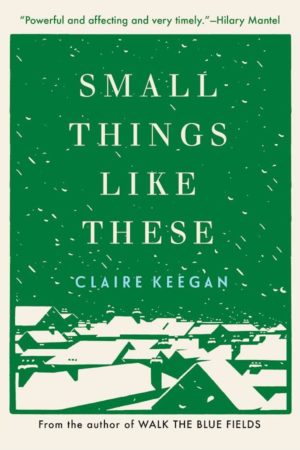Small Things Like These
by Claire Keegan
reviewed by Erik Hage
At just over one hundred pages, Irish writer Claire Keegan’s Small Things Like These is a deceptively slim volume. On the one hand, it has the scathing social and religious indictment of a longer novel; on the other, it is a quiet and morose character study, a novella that delves into one man’s psychology and moral fiber. This character study is really the bulk of the plot, which moves not through propulsion, but by a steady undertow of dread embodied by its protagonist, Bill Furlong.
Furlong is a coal and wood merchant living in a small Irish town in 1985. A family man, he enjoys a level of success that belies his origins: born to an unwed sixteen-year-old mother—a deep mark of shame in Catholic Ireland—Furlong, through the generosity of a wealthy Protestant benefactress, Mrs. Wilson, is able to escape poverty without getting separated from his mother.
Furlong is humble, hardworking, and deeply compassionate. When he sees a small boy foraging for sticks along the road, he offers him a ride and the change in his pocket, knowing that the boy’s father is an alcoholic. Furlong sees his own potential fate in the lives of the less fortunate and is kept up at night ruminating “over small things like these”—the random-seeming moments that separate good fortune from misfortune.
Furlong also spends a lot of time wondering about the identity of his father. Because of his “illegitimacy,” Furlong is a compelling central figure for the writer’s larger ambition, which is to condemn the “Magdalen laundries,” Catholic Church–sponsored homes in which disenfranchised girls and women were essentially incarcerated, put to work, and abused, sometimes ending up in unmarked graves. Their children often died there as well, or were surreptitiously offered up for adoption. Remarkably, these social institutions existed for more than two hundred years, the last one closing in 1996. Just as remarkable is the Irish state’s longstanding acceptance of them as a social institution.
It is a compelling plot device to put Furlong in conflict with this institution and the local Mother Superior after he discovers a girl locked in a convent coal shed, but the conflict appears suddenly, culminates quickly, and leaves too many questions unanswered. (An afterword explains the social context behind the story.) Also, what may be a life-changing revelation about Furlong’s father is delivered in an offhand manner.
At times, Small Things Like These begs for the full scope of a novel that moves beyond the story’s ending and deals with the consequences of the final act. At others, it begs to be pared down to a tauter, more suggestive short story. As it is, the insular psychological study and the biting social condemnation never fully fuse.
There is also a discomfiting imbalance between the rich and empathic portrayal of Furlong and that of the women in the story. All of them, besides Mrs. Wilson, who resides in memory, seem to be unfeeling enablers of a corrupt institution. Furlong’s wife, Eileen, the most vividly rendered of them, is downright scornful of her husband’s kindness and empathy. Furlong even sees his daughters, who otherwise get short shrift in the narrative, “as young witches sometimes … with their black hair and sharp eyes.” Nor do we get a full sense of Furlong’s mother beyond his memory of a “strong, freckled arm” and her singing while milking the cow.
Keegan is, however, a masterful renderer of environments, which accord with the sorrow and dismal hardship of the story. The book opens with a time-lapse–style image of the town in fall and winter, from the “yellow trees” of October to the “long November winds”: “chimneys threw out smoke which fell away and drifted off in hairy, drawn-out strings before dispersing along the quays, and soon the River Barrow, dark as stout, swelled up with rain.” Later, the descriptions reflect Furlong’s growing awareness of corruption:
On the street, a dog was licking something from a tin can, pushing it noisily across the pavement with his nose. Already the crows were out, sidling along and letting out short, hoarse caws and longer, fluent kaaahs as though they found the world objectionable. One stood tearing at a pizza box … quickly flying off with a crust in his beak.
Keegan’s prose is the kind you want to savor, and this story brings to light, particularly for non-Irish readers, a harrowing social history. Moreover, Furlong’s empathy, emotional scars, and redemptive morality are utterly absorbing. These, no small things themselves, often offset the lapses in structure.
Published on June 28, 2022

